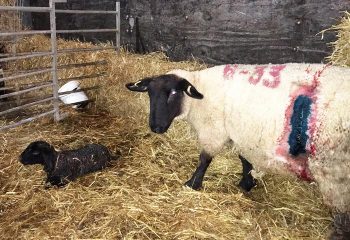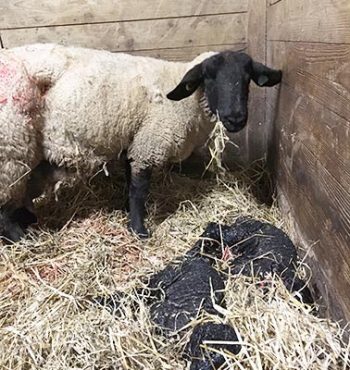5 Mar 2018
Emily Simcock discusses out-of-hours issues, consultancy work and other topics in her latest Practice Notes column.

I am writing this at the turn of the year, having returned from a nice Christmas break. I needed time away and felt refreshed for the busy times ahead, and it was a good job I did have a break, as Storm Dylan battered us before the new year, followed by Storm Eleanor shortly afterwards.
Every out-of-hours call has involved driving in the dark, through torrential rain, past pieces of flying tree. The pedigree sheep flocks are at the peak of lambing, with telephone calls coming for assistance either side of the new year gongs.
This mid-winter lambing totally throws my perception of seasons, but does it make me wish I did “smallies” only? Not usually. I love lambing sheep and calving cows, and there is something great about beating the elements to get a job done.
Mid-November to Christmas was quieter for the practice. Autumn calving finished, pre-movement testing for autumn store sales was over and spring calvers were scanned. This came in time to avoid a Ryanair-type crisis and everyone got a holiday. It also provided time for proactive work.
Aside from a few lambings, I did little sheep work in my previous clinical role, but am really enjoying it now. I’ve completed flock health planning on various farms – from pioneering, commercial producers to new entrants with 50 sheep. Call me sad, but when a farmer starts talking about measuring the grazing platform for his or her finishing lambs, I get quite excited.
It’s hard to make consultancy work pay, but the visits are so rewarding. We get to understand the systems, make suggestions to improve health and production, and open conversations about anthelmintic and antibiotic resistance.
A key change helping to justify low-cost consultancy is our ability to compete with the trade on POM-VPS products. Even small and medium flocks can spend more than £1,000 a year on vaccines, minerals and parasite control. Bringing both the advisory work and the sales of these products back in house is our ambition.

Conversations about parasite control were put into focus with the subject of sheep scab when the Western Counties Veterinary Association hosted CPD with Richard Wall from the University of Bristol, to update us on finding resistance to macrocyclic lactones in Wales.
Common grazing is a risk factor for endemic scab infection, and we have many commons in our territory. I recently confirmed sheep scab exposure using the new ELISA test in a common grazing flock. Some commons are well organised, with flock treatments coordinated, but in others, this does not happen.
A real risk of multiresistant scab seems to exist and legislative backing to a control programme is highly unlikely. Collaboration between practices, farmers and commons controllers is surely required.
It is hardly a contribution to collaboration, but when contacted by a local scientist wanting to see veterinary work in the field, I was happy to oblige. He is a virologist and immunologist researching and developing vaccines, including against bTB and bovine mastitis. Spending most of his time in a lab, he wanted to see first hand what TB testing involved, how farms work and what roles vets take in production animals.
I was concerned if he was mortally injured under my care on a farm, some potentially phenomenal vaccines might not make it to market. But he did get stuck in and is probably the most overqualified back gate man I’ve had TB testing.
I am excited by one health principles and loved an impromptu virology lesson in the farm kitchen afterwards about major zoonoses, disseminating vaccines for wildlife reservoirs and pandemic influenza. The farmers loved it too.
Remembering the scientific disciplines in which we trained, practising and promoting evidence-based principles is imperative, I believe. I was pleased to see the RCVS statement on alternative therapies and think it provides leadership and clarity.
I speak out when farmers tell me their bulk tank is positive for disease antibodies because the homeopathy is working. This misguided following of a belief-based medicine instead of using appropriate eradication techniques or scientifically proven vaccines is, without doubt, causing harm.
At the time of writing, publication of the gender pay gap by many companies was being reported in the media. It led me to ponder on the way women are treated in farm practice.
Not all companies have declared yet (April is the deadline) including my own. The list so far has a veterinary corporate with a significant gender pay difference (in favour of men).
This is not the same as pay equality for men and women doing the same job, but nevertheless poses questions about the types of roles and remuneration available to women in the companies. It may not always be an indicator of discrimination, but this is difficult to pin down. If you have never been a victim of, or witness to, discrimination then it is easy to think it does not exist.

My own experience, and those of several colleagues, would suggest gender discrimination in farm practice is all too common. I don’t know, but have no reason to believe I’ve ever been paid less than a male colleague doing the same job. I’ve also rarely experienced any direct sexism in my roles from clients, which may come as a surprise.
But, as a female parent, wow. The attitudes in the profession are frightening and, sadly, those expressing them probably don’t realise just what dinosaur era they reside in.
Before returning to practice in this role, my family and I were looking at options in a few different areas. I spoke to some practices advertising, and said I was looking for a four-day week and willing to do full on call. Responses included:
None of the vets I spoke with were older than 50 and not all were male. Now, it may be a male vet asking for a four-day week would find some resistance, too, but I struggle to believe he would be referred to as a “part-time boy”, considered a hassle or liability, or physically unable to do the job within a few years.
Fortunately, things have worked out well for me and I carry out my clinical director role in my practice four days a week, with a full share of OOH. I have two male colleagues who also work successfully part time, and I think we have a genuinely progressive view to flexible working.
This year looks likely to be a time of continuing change for farming and farm practice. I’m looking forward to the traditional vet work of spring, the potential for scientific collaboration and the ongoing development of the practice within this shifting landscape, but also my cherished day off per week just being a mum.
It doesn’t make me a lesser vet – just the opposite, I would argue.